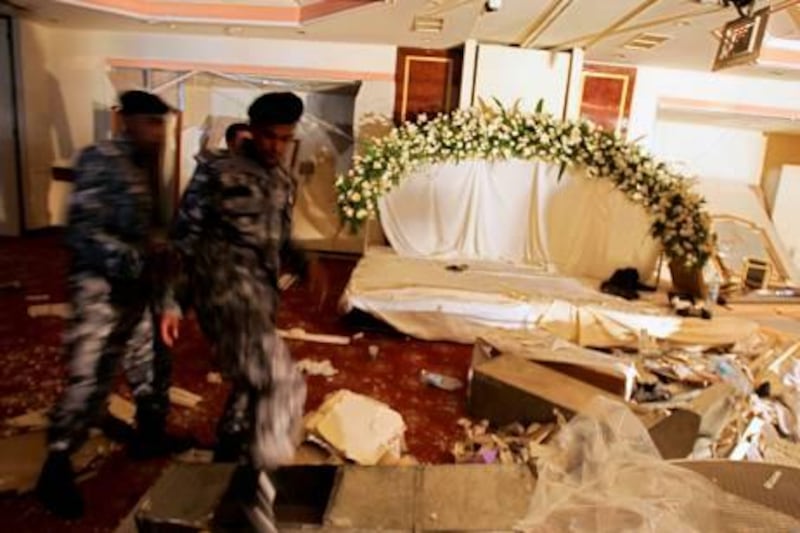AMMAN // More shocking than anything, perhaps, was the occasion the bomber chose.
Some 900 Jordanian and Palestinian guests were celebrating the wedding of Ashraf Al Khaled and his bride, Nadia Al Alami, in the Philadelphia Ballroom in Amman's Radisson SAS Hotel when Ali Hussein Ali Al Shamari, an Iraqi, jumped onto a table in the middle of the hall and detonated the explosives hugging his ribs.
The blast was one of three mid-evening attacks at Amman hotels on November 9, 2005, allegedly plotted by the late Abu Musab Al Zarqawi, a Jordanian and top Al Qaeda operative.
In all, 60 people were killed and another 115 wounded in the coordinated bombings, including the fathers of both the bride and groom, the Syrian-American movie producer Moustapha Akkad and leading lights of the Jordanian and Palestinian political establishment.
Nearly six years later, Mr Al Khaled recalls the happiest day of his life that ended awash in the blood of his father, his father-in-law and other friends and loved ones.
"It was a turning point for us in Jordan. The people began thinking, 'They are not God on earth. Who are they to judge our acts?'" said Mr Al Khaled, 38, a medical equipment salesman.
Indeed, a decade after September 11, suicide attacks have lost their potency in much of the region.
Due to their sheer, almost numbing frequency in the early part of the decade, they have lost some of the strategic and psychological effect on the people they targeted.
More importantly, statistics show, victims of suicide the bombings have been mainly Muslims and civilians - a fact that has gone a long way to discredit the political or religious justifications for suicide attacks that Al Qaeda and other militant Islamist organisations have cited in their defence.
Between March 20, 2003 and the end of 2010, for instance, suicide bombers killed 12,284 Iraqi civilians and wounded 30,644 others, according to a recent paper published in the London-based medical journal The Lancet.
During the same period, suicide attackers killed 200 foreign troops, including 175 Americans, the study said.
It was the reality of Muslim-on-Muslim violence that the Jordan attacks starkly exposed, says Assaf Moghadam, a terrorism analyst who has worked at West Point's Combating Terrorism Center and Harvard University's John M Olin Institute for Strategic Studies.
"On the one hand, they said they [militant Islamist groups] wanted to strengthen the Muslim community but if so, why kill all these Jordanians?" Mr Moghadem says.
While they appear to becoming increasingly obsolete, suicide bombings are still widespread, of course.
In the post-Second World War era, Tamil Tiger rebels in Sri Lanka are thought to be the first to use suicide bombings, but it was its use by Palestinian militants in the 1990s in their fight against Israeli occupation that gained the tactic international attention - and in some quarters, credence. Since then, suicide attacks have expanded eastward.
Long after 9/11, Shiites in Iraq are still a far bigger target than Americans and other westerners for suicide attacks carried out by Al Qaeda and other Sunni insurgent groups.
In Afghanistan, explosives hidden in headdresses - "turban attacks" - are on the increase, as insurgents shift their targets away from more fortified military facilities to softer, civilian targets.
And in Pakistan, suicide attacks have tragically become part of the rhythm of life.
Before 9/11, the country had only one suicide bombing. Since then, suicide bombers have struck Pakistani targets more than 290 times, killing at least 4,600 people and wounding 10,000. In 2010 alone, Pakistan average nearly six terrorist attacks of various kinds each day, according to a recent report by the Pak Institute for Peace Studies.
With the increasing civilian death toll from suicide attacks, the role of religion in justifying them has come under scrutiny.
The results of a recent public opinion survey taken among residents of the Middle East and North Africa suggests that any attempt to recruit religion to the service of justifying such attacks is fraught with complications.
A full 96 per cent of those who reject military attacks on civilians, for example, view religion as an important part of everyday life, said the survey, released this week by the Abu Dhabi Gallup Centre.
Some apologists for suicide attacks still insist that under some circumstances, however, suicide attacks are religiously justified.
"We do not see 'suicide bombing', as it's called by some, as something forbidden if it's against a legitimate target, and especially if no there are no other means available to fight with," said Nimer Al Assaf, the deputy general secretary for the Islamic Action Front, the political branch of Jordan's Muslim Brotherhood. His organisation refers to such attacks with the common term, "martyrdom operations".
He said it was important to distinguish between killing civilians and "occupying forces" - a reference to Israel and the US and Nato military presence in Afghanistan and Iraq.
For Mr Al Kahled, who lives every day with the horrifying memories of what happened on his wedding day, these are arid and hairsplitting debates, divorced from the reality of flying metal and body parts.
If there is a debate, he says, it should be over how people and societies really change and injustices are most effectively redressed. He points to the upheavals in the Arab world in 2011.
"In the past few months, we've seen these peaceful youth uprisings achieve what militants have been unable to do for the past 30 years," he said.
"That's powerful."





